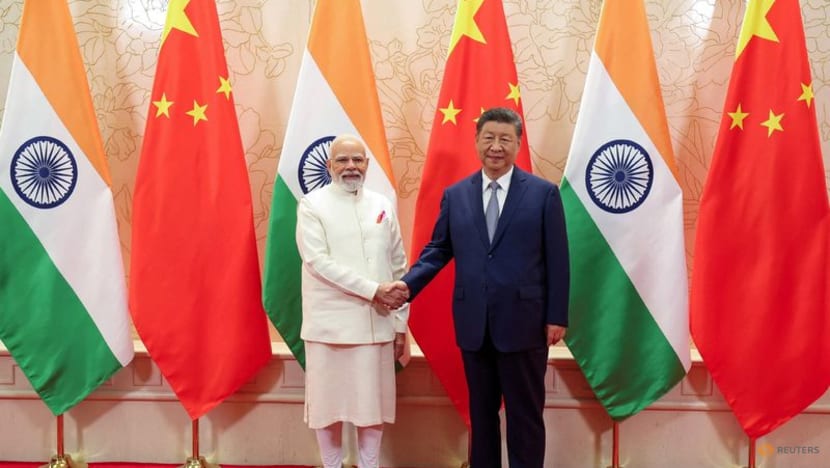Xi to Modi: the Chinese ‘dragon’ and the Indian ‘elephant’ need to be friends
The leaders meet for an hour in Tianjin on the Indian prime minister’s first trip to China in seven years.

India's Prime Minister Narendra Modi shakes hands with Chinese President Xi Jinping during a meeting on the sidelines of the Shanghai Cooperation Organization (SCO) Summit in Tianjin, China, Aug 31, 2025. (Photo: India's Press Information Bureau/Handout via Reuters)

This audio is generated by an AI tool.
TIANJIN: The world’s two most populous countries need to be friends, Chinese President Xi Jinping told visiting Indian Prime Minister Narendra Modi on Sunday (Aug 31).
Meeting on the sidelines of a Shanghai Cooperation Organization (SCO) summit in the northern Chinese city of Tianjin, Xi told Modi that the two countries could be good neighbours and play a key part in the Global South, according to footage posted online.
“China and India are two of the most ‘civilisational’ countries. We are the world’s two most populous countries and part of the Global South … It is vital to be friends, a good neighbour, and (for) the ‘dragon’ and the ‘elephant’ to come together,” Xi said in opening remarks.
In opening remarks posted on social media, Modi, who is on his first trip to China in seven years, said both countries had been moving in a positive direction since last year.
“We are committed to taking our relations forward on the basis of mutual trust, respect and sensitivity,” he said.
“After the disengagement on the border, an atmosphere of peace and stability has been created.”
The discussions took place at around noon and lasted nearly an hour.
Ties between the two countries nosedived after a deadly border clash in 2020, but Beijing and New Delhi have sought to mend fences in the past year, especially as both face stiff US tariffs.
The talks between Xi and Modi are not expected to resolve many major disputes, but the presence of the Indian prime minister in the northern port city is a sign of a strategic rethink to deal with geopolitical vulnerabilities.
Nevertheless, Modi will not join Xi, Russian President Vladimir Putin and North Korean leader Kim Jong Un in Beijing for a military parade on Wednesday.
Washington has spent years courting New Delhi as a counterweight to Beijing, but those efforts have been undermined this year by the White House’s decision to impose 50 per cent tariffs on Indian goods.
The tariffs are meant to punish India for buying Russian oil but Delhi has shown little sign of budging on the purchase, vowing to protect its national interests and reaching out to other trading partners.
Modi’s stop in China follows talks in Japan, where he and Japanese Prime Minister Shigeru Ishiba signed an economic security initiative for their countries to work together on semiconductors, artificial intelligence, critical minerals, clean energy and pharmaceuticals.
Tokyo also pledged US$67 billion in new investment in India over the next decade and to transfer new Shinkansen “E10 series” high-speed train technology.
In addition, the leaders renewed a 2008 security declaration aimed at keeping the Indo-Pacific free from regional threats, focusing on the management of technology on emerging fronts such as space and cybersecurity.
This article was first published on SCMP.

















